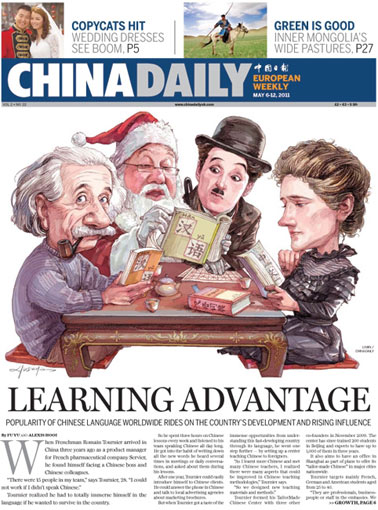Op-Ed Contributors
Is the Asian century upon us?
Updated: 2011-05-10 07:54
By Haruhiko Kuroda (China Daily)
Then there is the great challenge of governance and institution-building - the Achilles' heel for most Asian economies. Institutional quality must rise as much as corruption must be quashed.
The ultimate challenge is effective governance - governance that provides quality healthcare and education; the infrastructure to move goods and people; the creation of efficient, livable cities; stable banking and financial systems; and reliable, fair legal structures that protect citizens rights.
In short, Asian countries must modernize their governance systems and retool their institutions to ensure transparency, accountability and enforceability.
Globalization, embracing open-regionalism and better regional cooperation has helped bring us success thus far. If we strengthen this process further with innovation and entrepreneurship, focusing on greater inclusion within and across economies, if we pursue sustainable development and improve governance as the key building blocks for the future, then yes, an Asian century is both plausible and reachable.
It is time to look at ourselves in the mirror and learn from our mistakes as well as successes. Policies that worked when Asia was a low-income and capital scarce region are less likely to work today and unlikely to work in the future. Asia's leaders must devise bold and innovative national policies while pursuing regional and global cooperation.
I believe regional cooperation and integration are critical to Asia's march toward prosperity. Greater cooperation helps protect hard-won economic gains from external vulnerabilities. But it also cements the region's economic power and strengthens its voice in an ever-evolving global financial architecture. Regional cooperation is the bridge linking individual economies with the rest of humanity.
But even more important, Asians must learn to trust each other. Without trust little can be achieved in regional cooperation. Yes, Asians can learn from Europe's history. But we must also learn from our own history of transforming conflict into cooperation - the Association of Southeast Asian Nations and the Greater Mekong Subregion are two cases in point.
Asia's future global footprint carries with it new responsibilities and obligations. Global public good - such as free trade, financial system stability, climate change, and security - are responsibilities we must embrace, and show the world our willingness to be constructive in advancing the global commons. As an emerging global leader, Asia should act and be seen as a responsible global citizen.
Let me stress that the Asian century is not Asia's century. It will be the century of shared global prosperity where Asians will take their place among the ranks of the affluent - on par with those in Europe and North America.
Our challenges remain formidable. Future prosperity must be earned. And as advanced economies know well, it is never preordained.
The author is the president of the Asian Development Bank.
(China Daily 05/10/2011 page9)
E-paper

War of the roses
European Chinese rose growers are beating their Chinese rivals at their own game
High-tech park gets big boost
At the source
Merchant of Venice
Specials

2011 Sino-US Dialogue
China and the United States will hold the third round of the Strategic and Economic Dialogue from May 9-10 in Washington.

High-tech park gets big boost
Zhongguancun sets sights on being one of the top technology hubs in the world

Learning to close the gap
Thousands of students have benefited from Tibet middle school program set up outside the autonomous region
